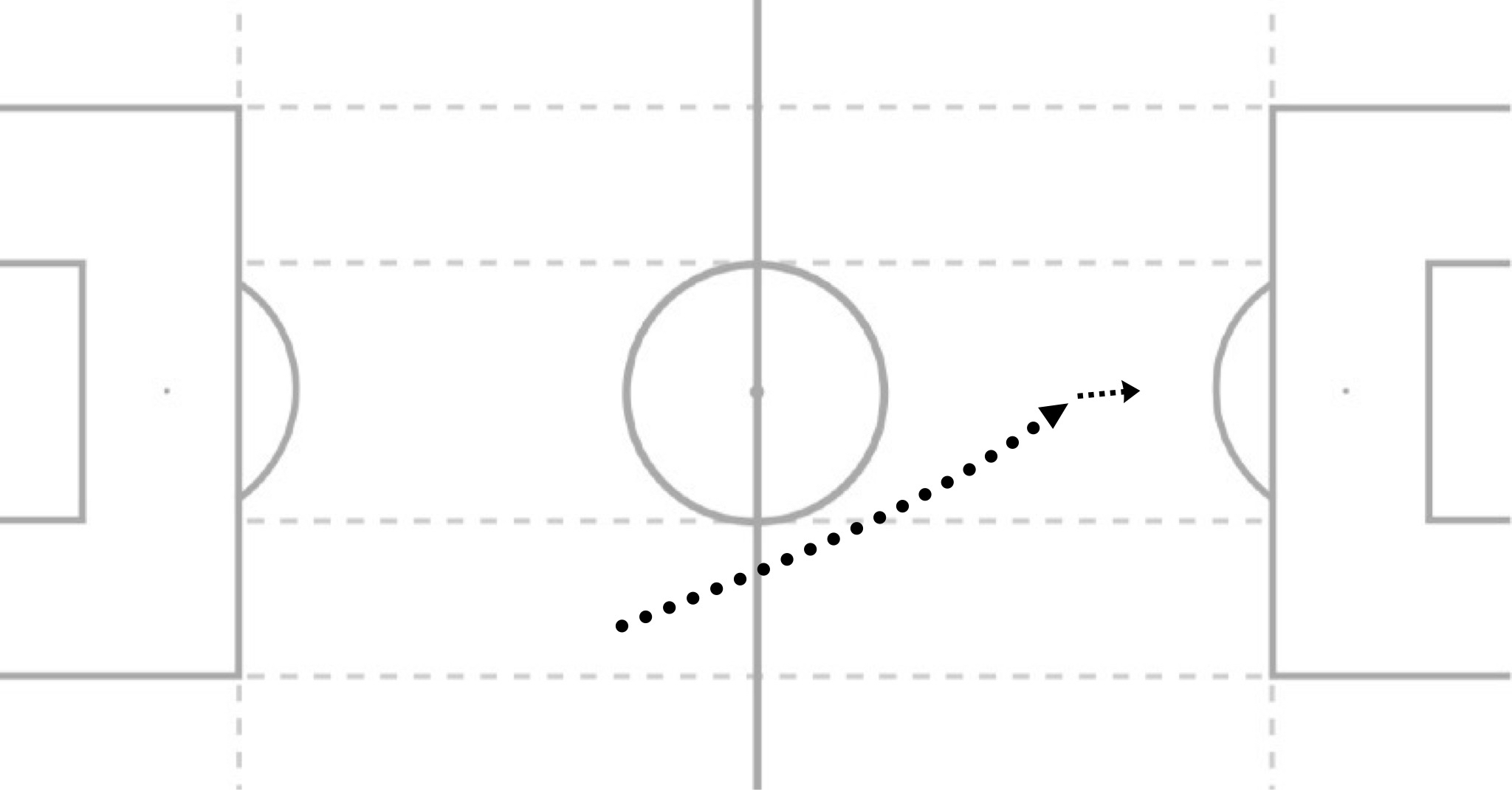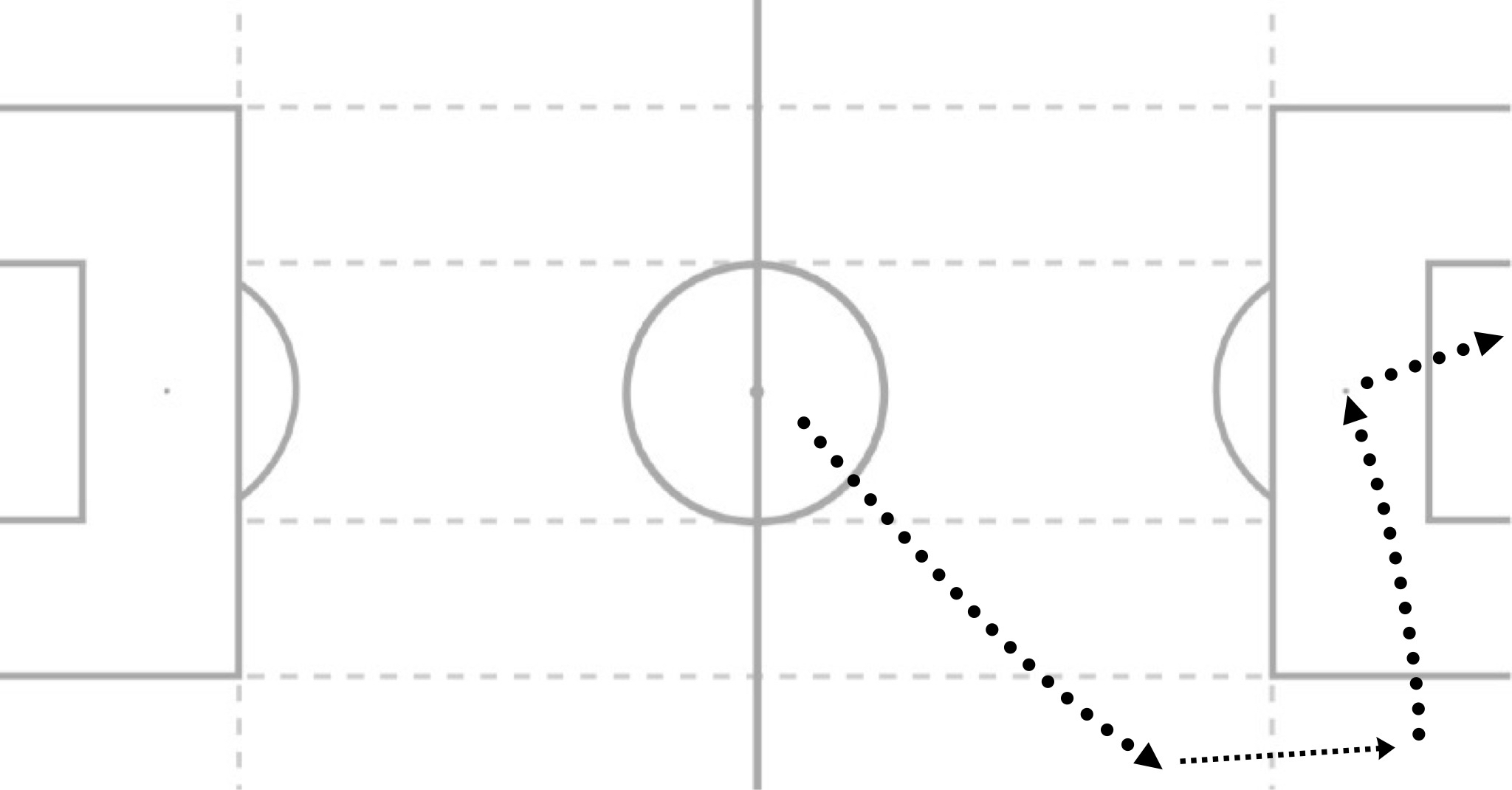Move with the wind
23 December 2024
Wind is swirling; the ball moves even when the ball is stopped. If you try to attack through the middle, on the ground, the ball bobbles too much. Attack in-to-out, then out-to-in to move with the wind.

This pass out-to-in, into the middle of the pitch, leads to an uncontrolled touch. Even for a skilled dribbler of the ball like Cole Palmer, it is hard to get a satisfactory first touch. You take a touch; there is unforeseen backspin, the ball gets stuck between your legs, you are no longer facing play, and you are searching for the next touch. By the time you find the second touch, two defenders have put a leg in, and then you can’t get that pass out to the wings to release the attack.
I’m talking high wind. Wind that would annoy even those that avoid playing through the air.
It is harder to work the ball into the middle, out from the back, and then out to the wings in high wind for this reason. Playing one- or two-touch football is too unpredictable and frustrating.

With this pass in-to-out, the ball gets carried out to the wing quicker with the wind at its back. If you are facing the wind, the ball floats. In both scenarios, you’ll need the space the wing offers to take that first touch because the first touch will be difficult to control.
And then if you get a quick low cross in, shoulder height off the ground, into that back post, the defenders will have as much trouble controlling the ball as Cole Palmer did when you attempted that pass out from the back into the middle, because the forwards attacking the ball will be facing the goal, and the defenders will be facing the ball.
It is easier to control the ball when you are facing the goal than it is when you are facing with your back to the goal in high wind.
2026
January
- 18th
2025
December
- 26th
- 21st
- 16th
- 7th
- 3rd
November
- 29th
- 24th
- 20th
- 14th
- 12th
- 8th
- 7th
- 4th
- 2nd
October
- 31st
- 28th
- 22nd
- 20th
- 19th
- 12th
September
- 30th
- 28th
- 26th
- 24th
- 23rd
- 20th
- 18th
- 16th
- 14th
- 4th
- 3rd
- 1st
August
- 28th
- 27th
- 26th
- 25th
- 24th
- 23rd
- 20th
- 17th
- 14th
- 12th
- 10th
- 8th
- 4th
July
- 10th
- 5th
- 4th
June
- 29th
- 14th
- 13th
- 12th
- 2nd
May
- 29th
- 25th
- 22nd
- 20th
- 15th
- 8th
April
- 30th
- 9th
March
- 28th
- 5th
February
- 26th
- 20th
- 19th
- 12th
- 8th
January
- 31st
- 30th
- 16th
- 12th
- 9th
- 8th
- 7th
- 6th
- 5th
- 4th
- 3rd
- 2nd
- 1st
2024
December
- 31st
- 30th
- 29th
- 28th
- 27th
- 26th
- 25th
- 24th
- 23rd
- 22nd
- 21st
- 20th
- 19th
- 18th
- 17th
- 16th
- 15th
- 14th
- 13th
- 12th
- 11th
- 10th
- 9th
- 8th
- 7th
- 6th
- 5th
- 4th
- 3rd
- 2nd
- 1st
November
- 30th
- 29th
- 28th
- 27th
- 26th
- 25th
- 24th
- 23rd
- 22nd
- 21st
- 20th
- 19th
- 18th
- 18th
- 16th
October
- 21st
- 12th
- 11th
- 9th
- 7th
- 6th
- 4th
- 3rd
- 2nd
- 1st
September
- 30th
- 29th
- 27th
- 26th
- 25th
- 24th
- 23rd
- 22nd
- 21st
- 20th
- 19th
- 18th
- 17th
- 16th
- 15th
- 14th
- 13th
- 12th
- 11th
- 10th
- 9th
- 8th
- 7th
- 6th
- 5th
- 4th
- 4th
- 3rd
- 2nd
- 1st
August
- 31st
- 30th
- 29th
- 28th
- 27th
- 26th
- 25th
- 25th
- 24th
- 23rd
- 22nd
- 21st
- 20th
- 20th
- 19th
- 19th
- 18th
- 17th
- 16th
- 15th
- 14th
- 14th
- 13th
- 12th
- 11th
- 10th
- 9th
- 8th
- 7th
- 7th
- 6th
- 5th
- 4th
- 3rd
- 2nd
- 1st
July
- 31st
- 30th
- 29th
- 28th
- 27th
- 26th
- 25th
- 24th
- 23rd
- 22nd
- 21st
- 20th
- 19th
- 18th
- 17th
- 16th
- 15th
- 15th
- 14th
- 13th
- 11th
- 10th
- 9th
- 8th
- 7th
- 6th
- 5th
- 4th
- 3rd
- 2nd
- 1st
June
- 30th
- 29th
- 28th
- 27th
- 26th
- 25th
- 24th
- 23rd
- 22nd
- 21st
- 20th
- 19th
- 18th
- 17th
- 16th
- 15th
- 14th
- 13th
- 12th
- 11th
- 10th
- 9th
- 8th
- 7th
- 6th
- 5th
- 4th
- 3rd
- 2nd
- 1st
May
- 31st
- 30th
- 29th
- 28th
- 27th
- 26th
- 25th
- 24th
- 23rd
- 22nd
- 21st
- 20th
- 20th
- 19th
- 18th
- 17th
- 16th
- 15th
- 14th
- 13th
- 12th
- 11th
- 10th
- 9th
- 8th
- 7th
- 6th
- 5th
- 4th
- 3rd
- 2nd
- 1st
April
- 30th
- 29th
- 28th
- 27th
- 26th
- 25th
- 24th
- 23rd
- 22nd
- 21st
- 20th
- 19th
- 17th
- 16th
- 15th
- 14th
- 13th
- 12th
- 11th
- 10th
- 9th
- 8th
- 7th
- 6th
- 5th
- 3rd
- 2nd
- 1st
March
- 31st
- 30th
- 29th
- 28th
- 27th
- 26th
- 25th
- 24th
- 23rd
- 21st
- 20th
- 19th
- 18th
- 17th
- 16th
- 15th
- 14th
- 13th
- 12th
- 11th
- 10th
- 9th
- 8th
- 7th
- 6th
- 5th
- 4th
- 3rd
- 1st
February
- 28th
- 27th
- 26th
- 25th
- 23rd
- 22nd
- 21st
- 20th
- 18th
- 15th
- 14th
- 13th
- 12th
- 11th
- 8th
- 7th
- 6th
- 5th
- 4th
- 3rd
- 2nd
- 1st
January
- 31st
- 30th
- 29th
- 28th
- 27th
- 25th
- 24th
- 22nd
- 21st
- 20th
- 18th
- 17th
- 16th
- 15th
- 14th
- 13th
- 12th
- 11th
- 9th
- 8th
- 7th
- 6th
- 5th
- 4th
- 3rd
- 2nd
- 1st
2023
December
- 31st
- 29th
- 28th
- 27th
- 25th
- 24th
- 22nd
- 21st
- 20th
- 19th
- 18th
- 17th
- 16th
- 15th
- 13th
- 12th
- 11th
- 10th
- 8th
- 7th
- 6th
- 4th
- 3rd
- 2nd
- 1st
November
- 30th
- 29th
- 28th
- 27th
- 26th
- 25th
- 24th
- 23rd
- 22nd
- 21st
- 20th
- 18th
- 17th
- 16th
- 15th
- 14th
- 13th
- 12th
- 11th
- 10th
- 9th
- 8th
- 7th
- 6th
- 5th
- 4th
- 3rd
October
- 31st
- 30th
- 29th
- 27th
- 26th
- 25th
- 24th
- 23rd
- 22nd
- 19th
- 17th
- 15th
- 14th
- 13th
- 12th
- 11th
- 10th
- 9th
- 8th
- 7th
- 6th
- 5th
- 4th
- 1st
September
- 30th
- 28th
- 26th
- 25th
- 24th
- 22nd
- 21st
- 20th
- 19th
- 18th
- 17th
- 9th
- 3rd
August
- 31st
- 28th
- 27th
- 26th
- 21st
- 20th
- 15th
- 14th
- 13th
- 12th
- 7th
- 4th
- 3rd
July
- 31st
- 30th
- 28th
- 27th
- 25th
- 24th
- 23rd
- 22nd
- 21st
- 20th
- 19th
- 18th
- 17th
- 16th
- 15th
- 14th
- 13th
- 12th
- 11th
- 10th
- 9th
- 8th
- 7th
- 6th
- 5th
- 4th
- 3rd
June
- 11th
- 10th
- 7th
- 5th
- 4th
- 1st
May
- 28th
- 27th
- 26th
- 25th
- 24th
- 23rd
- 22nd
- 21st
- 20th
- 19th
- 18th
- 17th
- 16th
- 15th
- 14th
- 13th
- 11th
- 10th
- 9th
- 8th
- 7th
- 5th
- 4th
- 3rd
- 2nd
- 1st
April
- 29th
- 28th
- 27th
- 26th
- 25th
- 24th
- 23rd
- 22nd
- 22nd
- 21st
- 20th
- 2nd
March
- 6th
February
- 27th
- 20th
- 5th
January
- 19th
